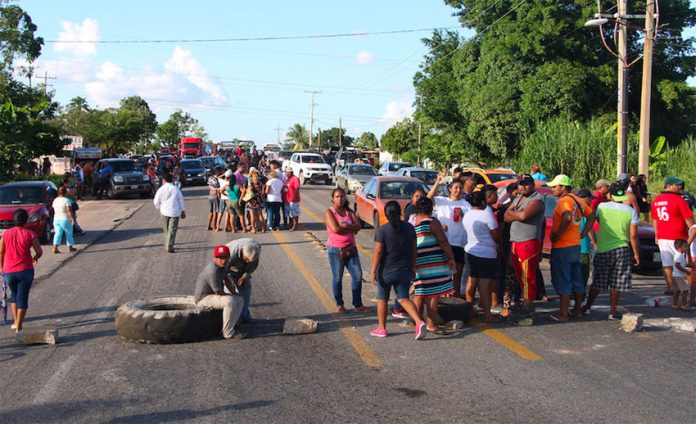The Tabasco Congress has approved legislation that sets harsh punishments for protests that block access to businesses and highways or obstruct public works projects.
Dominated by members of Mexico’s ruling Morena party, the Congress voted 24 to one yesterday in favor of modifying the state’s criminal code to establish prison sentences from six to 20 years for protesters who adversely affect third parties.
The reform comes as the federal government prepares to build a US $8-billion refinery on the Gulf of Mexico coast in the municipality of Paraíso.
Under the new legislation, demonstrators who “fully or partially block free transit of people, vehicles or other specialized machinery used in public or private works projects” will face jail sentences of six to 13 years and a fine of up to 2,000 minimum daily wages, which adds up to around 169,000 pesos (US $8,900). Those blocking businesses can be imprisoned for up to 20 years.
Morena lawmakers argued that the changes are aimed at stopping groups from using protests as extortion to obtain financial benefits or jobs at the Dos Bocas refinery project.
“The most serious thing is that there is aggressiveness [in the protests] . . . These pseudo-groups now even come armed, they carry out beatings when they’re not given what they want, they detain people in a kind of express kidnapping in order to coerce,” said Exequias Braulio Escalante, a Morena deputy.
“It’s not an anti-protest law. It’s an anti-extortion reform. This is very clear,” said Tabasco government secretary Marcos Medina Filigrana.
Governor Adán Augusto López denied that the changes to the criminal code amount to a ley garrote, or club law, as the legislation has been characterized by critics.
Instead, the reform is aimed at punishing the extortion of union groups with links to Mexico’s once omnipotent Institutional Revolutionary Party, he said.
“It wasn’t a secret for anyone – we even said it during the campaign – that we were going to work to end the extortion and blackmail of union groups, pseudo-union groups – groups that shut off free transit for any reason,” López said.
Erika Guevara Rosas, Americas director at Amnesty International, called the law “a clear violation of freedom of expression in Mexico.”
Nevertheless, the law received the endorsement of President López Obrador, a Tabasco native who participated in scores of protests in his home state – including blockades of Pemex facilities – while cutting his political teeth and called for mass marches in Mexico City after his defeat in the 2006 presidential election.
“. . . There was extortion and it was necessary to establish order. That was the reason for this legislation,” he said at his morning press conference on Monday.
The president declared that the legislation doesn’t violate people’s rights or freedoms.
“Of course, citizens’ rights have to be protected . . . the right to dissent, to protest, to freedom in general, that has to be considered but I have a report that human rights are not affected and citizens’ freedoms are not limited. That’s the report I have and yes, it’s necessary to put an end to extortion and not allow corruption,” López Obrador said.
Contradicting statements made by Morena party lawmakers in Tabasco, the president said the purpose of the legislation was not to stop protests during construction of the Dos Bocas refinery.
“No, that’s not the intent. In the case of Dos Bocas, there’s no opposition in Tabasco, the people are happy, a consultation was carried out in Paraíso, where the refinery will be built and in all of Tabasco the people are happy,” López Obrador said.
The president’s backing of the anti-protest legislation was labeled as hypocritical by some given his history and refusal to condemn teachers’ unions that have long held disruptive demonstrations.
“It’s hypocritical for someone who made his entire career on a reputation for protests and blockades,” said Gerardo Priego, a National Action Party federal deputy.
“Who’s going to define if it’s extortion or not? Won’t his buddies be protesters and his opponents extortionists?”
Javier Garza, a political analyst in the city of Torreón and a former newspaper editor, told The Guardian that López Obrador “benefited from marches and protests and investigative journalism that revealed corruption or ineptitude on the part of politicians he once opposed.
“Now that he’s president, protests and journalistic investigations are going against him – and he doesn’t like it.”
Source: Reforma (sp), Animal Político (sp), The Guardian (en)
